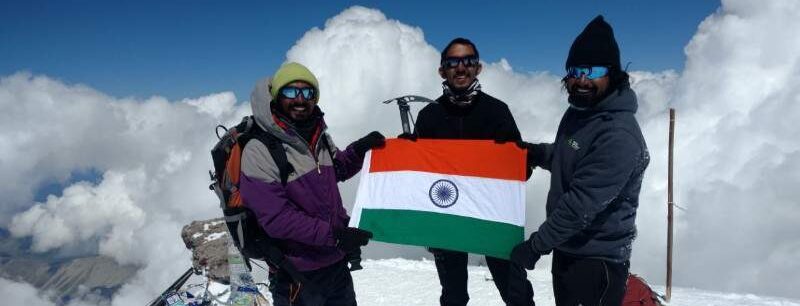Ipshita Seal is a co-founder of an environmental conservation start-up, EcoFixtures, in Ladakh. She is a Naropa Fellow, and has been an AIESEC Global volunteer. Ipshita loves languages and to travel.
Ipshita, we would like to hear about you joining the Naropa Fellowship in Ladakh, your learnings there and your entrepreneurial start. We hope that other youngsters and students who read about your journey will also feel inspired to take bold decisions.
i. People choose careers for different reasons. What was your reason for making this choice?
Globally, as we have seen and experienced the effects of climate change, it became increasingly apparent to me that I wanted to do some meaningful work in the space of environmental conservation. In my opinion, this is definitely the need of the hour. The venture Eco-Fixtures, that I co-founded along with my business partner, is one that aims to address groundwater pollution and water scarcity in Ladakh.
Eco-Fixtures offers new and innovative dry toilet designs and models in Ladakh. Dry toilets are a type of toilet that do not use water, and turn the organic material into compost over a period of months if utilized correctly. This keeps the nutrient cycle intact, and does not pollute the environment
by way of fecal sludge. This type of toilet has been used locally for generations, though with very little innovation in its design. By providing a first-of-its-kind innovative model that is user-friendly, safe, and hygienic, we can compete with water-chamber toilets, and combat the rapid shift in user preference toward W/Cs.
ii. Tell me about the beginning of your journey.
The Naropa Fellowship is a residential postgraduate program in Entrepreneurial Leadership that takes place in Ladakh. Fellows reside at the campus for a year, during which time they have the opportunity to interact with their peers and ideate potential businesses together. The entrepreneurial journey was an altogether new experience for me, as I have an educational background in liberal arts from Ashoka university. The Naropa fellowship gave me a chance to be a part of creating meaningful change, and I was blessed to have a great mentor along the way, who helped facilitate the most crucial decisions.
I joined the Naropa fellowship batch of 2021 and met my team in November 2020. At this point, our idea was to make functional toilets at Khardung La, the world’s second-highest motorable pass, located in Ladakh. The harsh weather conditions there make it extremely difficult to operate W/Cs, since the water in the pipes freezes, rendering the toilets unusable. At the moment, there are no functional toilets there, and so tourists and passers-by go in the open. This is an unsustainable practice, given the numbers the place sees each day during the peak tourist season. Through the course of the year, as we spoke to various stakeholders and mentors, our idea modified to the one we have today.
iii. What apprehensions did you or maybe your parents have?
The biggest apprehension was definitely the prospect of moving to Ladakh during a pandemic and living there in the extreme climatic conditions. Getting through the winter in particular was a daunting prospect. Apart from this, one also has their apprehensions about becoming an entrepreneur, since it involves high risks, and few returns for a while in the beginning.
iv. In what ways was this different from doing a traditional academic program
As the program is about entrepreneurship, the focus is as much on one’s Live Action Project (the business idea that one works towards individually or as part of a team) as it is on the classes that take place throughout the year. Further, a good portion of the courses offered are geared towards teaching one the ins and outs of running a venture.
v. How has this made you grow?
One of the most rewarding parts about the entrepreneurial journey is that starting a venture provides you the opportunity (and requires you) to take up many different roles within the organization, simultaneously. This can be quite challenging since most of it is learnt on the go, but with guidance it
can be an amazing space for people who value these learnings.
vi. Does India offer enough opportunities in this field?
Not as of yet, though more universities are starting to offer courses and programs in Entrepreneurship. To me, the undergraduate level seems a good time to introduce students to the field, rather than later on.
vii. Some skills are innate and some of them, one has to acquire. Tell me about yours.
At Eco-Fixtures I look after research, content, communications, and finance. The first two areas are ones that I have experience in from before I joined this team, and the latter two are areas that I (continue to) learn about in practice
viii. How important was money to you when you made this choice?
Our venture was started with the hope of making a tangible environmental impact, which remains our primary objective. It is not our intention to scale up to the extent that we are running a large organization with hundreds of employees, but more to drive (local) user preferences in the direction of
sustainable choices.
xi. What are your thoughts about career guidance? How would correct guidance help students?
In my experience, high school students are often unaware of the multitude of career options they have, and therefore may feel compelled to make mainstream choices. There is always a chance that they may regret this later, so it’s best to participate in career counseling at the earliest stage that one feels ready.
It’s also crucial that one chooses a college suitable to one’s interests and inclinations so as to make the most out of their college experience and thrive, which is where a counselor comes in.
You can read more about Ipshita Seal’s current field of work, which addresses sanitation challenges in locations without piped water, in the Indian Himalayas.
